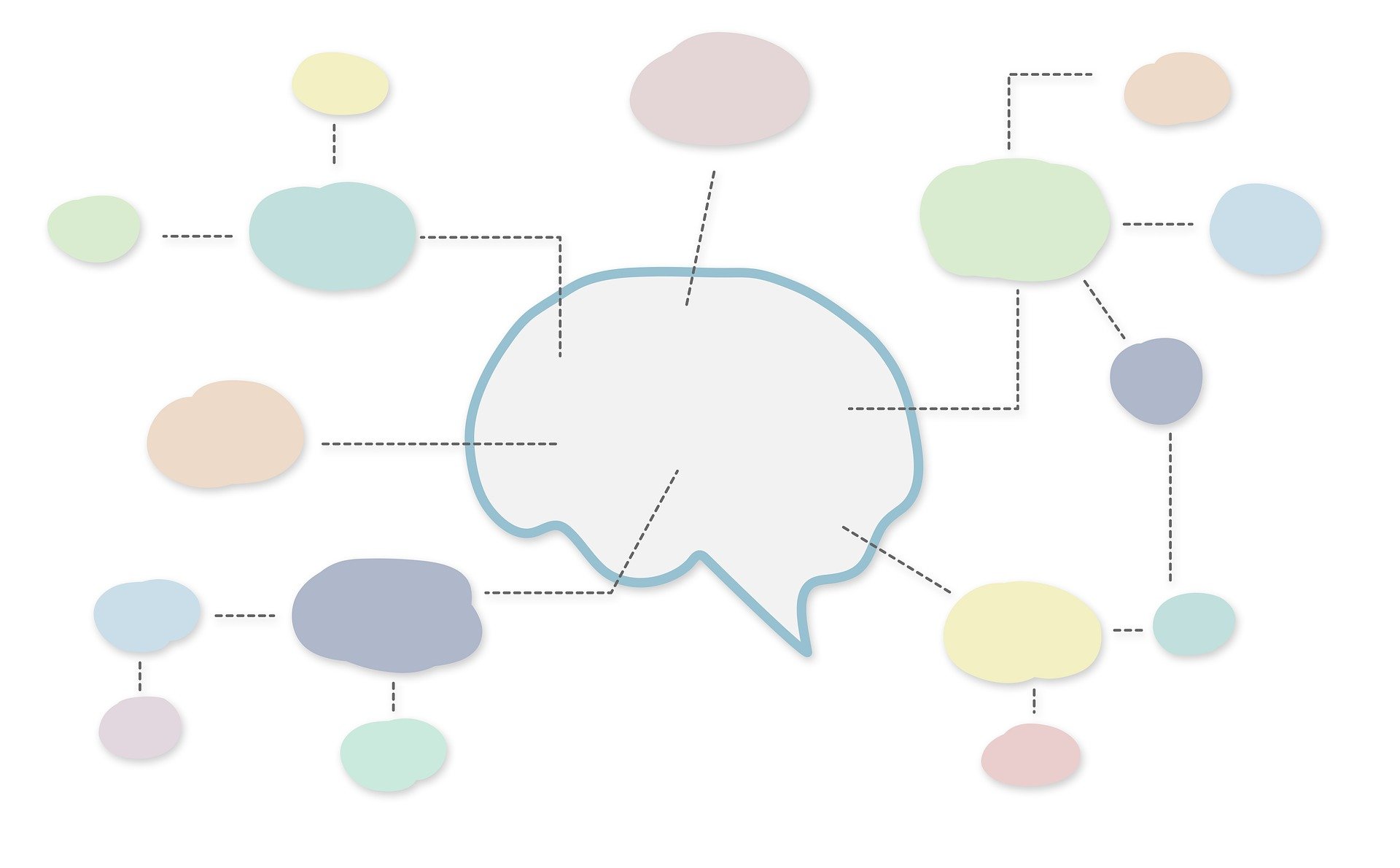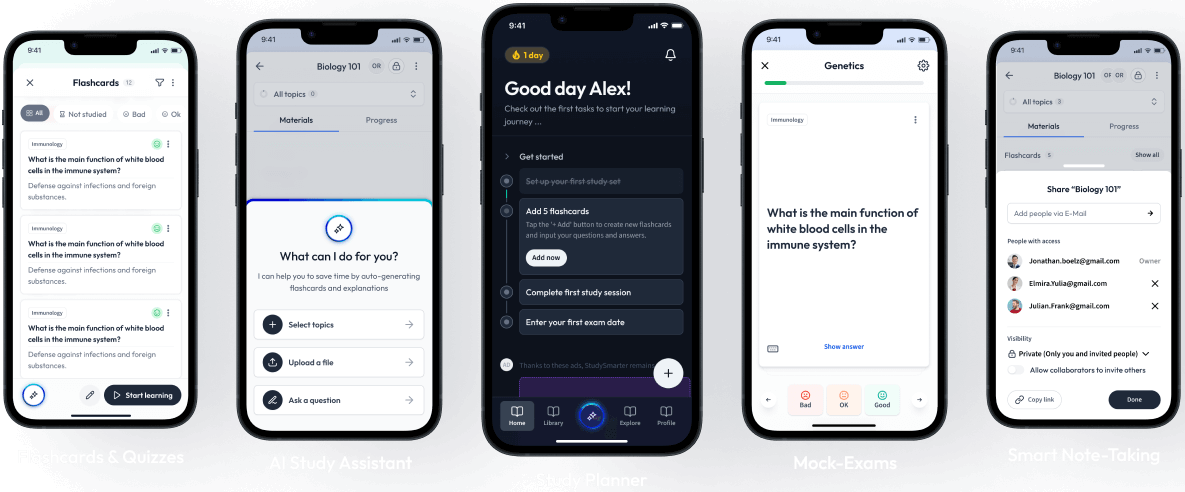
StudySmarter: Study help & AI tools
4.5 • +22k Ratings
More than 22 Million Downloads
Free
We've all been there: the task is to write an engaging and knowledgeable essay, but the page is staring back, dauntingly empty. Being aware of the different skills that go into writing a good essay can make tackling this first step much easier and help you improve your writing once you get going. So, if you're not sure where to start, don't worry! We will explore tips and tricks to help you develop the skills you need to write an essay that is clear, informative, and will impress your reader.



Lerne mit deinen Freunden und bleibe auf dem richtigen Kurs mit deinen persönlichen Lernstatistiken
Jetzt kostenlos anmeldenWe've all been there: the task is to write an engaging and knowledgeable essay, but the page is staring back, dauntingly empty. Being aware of the different skills that go into writing a good essay can make tackling this first step much easier and help you improve your writing once you get going. So, if you're not sure where to start, don't worry! We will explore tips and tricks to help you develop the skills you need to write an essay that is clear, informative, and will impress your reader.
When writing an essay, there are different elements and skills to consider. For example:
The essay format - this refers to the physical appearance of your essay. How will it be arranged on the page?
The essay content - this refers to what you will write. What will your essay be about and what points will you make?
Essay writing skills - this refers to the ability to turn your ideas into words. How will you convey your thoughts and argument to the reader in a clear, concise way?
Now, let's explore these in more detail!
It is important to understand the basic format of an essay. This way, you will be able to plan your content around the basic format of an essay: the introduction, main body, and conclusion.
The introduction is the opening paragraph of your essay. It tells the reader about the topic you are writing about and briefly states the main points you will expand on throughout the main body of your essay. An introduction usually contains:
Other words for 'essay brief' that you may be familiar with include 'thesis' or 'main argument'.
The main body is split into different paragraphs. This is where you expand on your ideas or your argument to show the reader that you are able to analyse and interpret information effectively while also forming your own opinion on the topic. A good structure to follow when writing the main body paragraph is PEE. This stands for: point, evidence, explain:
The conclusion is the final paragraph of your essay. It summarises the main points made throughout your essay and gives the reader something to think about when bringing the essay to a close. A conclusion usually does these three things:
In the main body of your essay, it's your chance to show off your critical thinking skills and let the reader know how knowledgeable you are about your essay topic!
But, what is critical thinking? Let's begin by looking at the meaning:
Critical thinking refers to the process of analysing and evaluating information in a skilful way.
Critical thinking helps to strengthen your point of view and enhance the way you express your ideas. It also helps you to reflect on your own opinion and also to question the views of others. In short, critical thinking involves not just taking things at face value.
Critical thinking also enables you to read between the lines, i.e., by considering meanings that may not be initially obvious. When thinking critically, you should consider the following:
We will now look at a few things you can do to help improve your English essay writing skills. It is important to note that these are simply suggestions; everyone writes in different ways and will find different things helpful!
There are different steps you can take before, during, and after writing an essay to ensure that your thoughts are well organised and your work is clear.
Before writing an essay, it can be very helpful to write down your initial ideas to help you plan out what you want to focus on in your writing.
 Fig. 1 - Mind map example.
Fig. 1 - Mind map example.
Planning for an essay can be done in various ways. You could organise your thoughts by creating a mind map like the one shown above, for example, or you could write a list.
Whichever way is best for you, you should begin by focusing on your essay brief or question. It is important to have a good understanding of the main purpose of your essay or the question you will be answering. This will make it easier to plan out the rest of the writing. It may be useful to highlight any keywords in the brief/question so that you know what to focus on when writing.
You could highlight instruction verbs as these can help you to understand exactly what the question is asking you to do. Examples include:
When planning your essay, you should also ask yourself the following questions:
What is the brief/question telling me to do?
Do I understand the purpose of my essay?
Do I have to argue for or against something?
Can I develop this in the main body of my essay?
You could separate your plan into different sections to help determine the main points you will make in each paragraph:
Essay brief/question: Explore the ways slang can either have a positive or negative impact on teenagers.
Now you've finished your plan, it's time to look at each section of your essay in more detail and start writing.
When stating the brief in your introduction, consider the following questions:
What is my essay about?
What is the purpose of this essay?
When outlining the main points and/or argument you will make in your introduction, consider the following questions:
Am I arguing for or against something?
What am I trying to prove to the reader?
What key points will I further expand on in the body of my essay?
Am I going to be discussing/analysing any theories?
During the writing of the main body of your essay, you should ensure that your ideas are clear and flow well. A good way to do this is to link your writing back to the brief. Linking back to the brief is important to show that you understand it fully and your argument clearly relates to it.
If you are answering the question:
'Do you agree or disagree that the internet has positively impacted communication?'
You could link your paragraph back to the question by writing:
'This shows that the internet has/has not (depending on your argument) positively impacted communication because…'
Linking can also be done between paragraphs – think of your paragraphs like a chain!
You could link the final idea of one paragraph to the next idea of the following paragraph. This will help to create a coherent flow and will ensure that all of your ideas relate to one another.
Another way to make sure your ideas are clear is to make sure your vocabulary is not too complicated. Although you may think that advanced vocabulary is more impressive, it is often unnecessary! Complicated language may cause confusion between you and the reader, as they may not understand the meaning of the words and could get distracted from the main purpose of your essay.
Because of this, it is better to stick to vocabulary that you are familiar with, as this will ensure your writing is concise and your main points are easier to understand for the reader.
When writing your conclusion, you could consider the following questions:
What is the main message of my essay?
What ideas did I raise in the main body of my essay?
What is my overall opinion of the topic?
How did I contribute to the study of my topic?
After you have finished writing, you should allow yourself time to proofread your work to ensure that you have not made any obvious mistakes such as spelling or grammar errors.
Put your proofreading abilities to the test! Can you spot the errors in the following essay writing example?
It could be argued that the internet has had a positive impact on communication one reeson for this is ability to contact people quickly. Social media platforms such as facebook and instagram have enabled people to to engage in instant messaging, which lets people eficiently send and receive messages at a fast speed.
Below is the correct version of the text. The parts that have been corrected are highlighted:
It could be argued that the internet has had a positive impact on communication. One reason for this is the ability to contact people quickly. Social media platforms such as Facebook and Instagram have enabled people to engage in instant messaging, which lets people efficiently send and receive messages at a fast speed.
To write an essay, you should first be aware of the essay format: introduction, main body, and conclusion. The introduction tells the reader about your essay brief and the main points you will make. The main body expands on your main points. It allows you to analyse information, develop an argument, and form your own opinion. The conclusion summarises your essay brief and the main points of your argument.
An essay is a piece of writing that explores a topic by evaluating ideas, analysing evidence, and building an argument.
There are different steps you could take to improve your essay writing skills. For example:
5 good skills to have when writing an essay are as follows:
Typically, the 5 parts of an essay are as follows:
(This may differ depending on the type of essay or the word count).
What does PEE stand for?
Point, evidence, explain.
What is a point?
A statement relating to the question you are answering.
What is evidence?
Examples used to back up your point.
What does 'explain' refer to?
Going into detail about how your quote backs up your point and considering what it suggests/implies.
Fill in the blank:
You should ____ your explanation back to the question.
Link
A quote should be long.
True or false?
False.
Try to keep quotes short and succinct!

Already have an account? Log in
Open in AppThe first learning app that truly has everything you need to ace your exams in one place


Sign up to highlight and take notes. It’s 100% free.
Save explanations to your personalised space and access them anytime, anywhere!
Sign up with Email Sign up with AppleBy signing up, you agree to the Terms and Conditions and the Privacy Policy of StudySmarter.
Already have an account? Log in